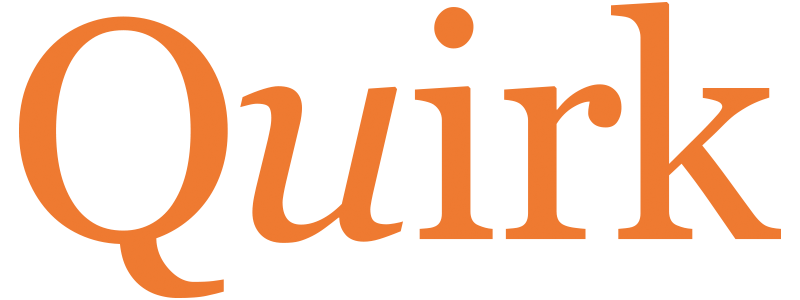Guest Presenter: Kate Philp, Quirk Solutions Associate and Leadership Trainer
There is a subtle, but very important difference between courageous and confident decision-making. Both equally important as each other but, none the less, they can have significant impacts on the consequences of the decisions we make either in our personal lives or in the boardroom.
Kate Philp is the guest presenter in our latest podcast and in it she discusses the difference between the two platforms by (bravely) drawing a parallel to her own experience of having her leg amputated. Kate also sheds a new light on how we view leadership and the importance of being able to lead ourselves before we lead others.
Listen to the podcast:
Full Podcast Transcript can be found here:
Hi, I’m Kate Philp and over the next 7 to 8 minutes I’m going to talk to you about some of the differences between confident leadership and courageous leadership, particularly when it comes to decision-making. Now to put this into context, I’m a former army officer who was injured in service, so I’m going to draw on my experience of leading others, often in a high-pressure situation, but also having had to readdress how I’ve led myself through personal adversity, if you like. I’m now a leadership trainer and coach and I thought of this topic because I’ve often heard people in sessions cite a lack of confidence as the reason why they struggle with a particular area of their life, either their professional or personal lives. A common example of this is speaking in public or perhaps delivering bad news to an employee, to a team member etc.
But it struck me that I’ve rarely heard, if ever, a client admit to needing more courage and sometimes I think that this would be a more helpful resource to work on and to build. Now for me, there are two areas of distinction between confidence and courage, though I’m sure there are many others that you could find. One of these points of difference is the amount of information that we have available to us when we are posed with a problem and I think the less information there is, then the more courageous your decision has to be. And the other difference is the level of discomfort that the problem you are facing provokes in you. Of course, you’ve got to be honest here as some people will exaggerate how uncomfortable they are and others are very likely to downplay it. But the further you need to step outside your comfort zone then the more courage you need.
So let me share a couple of personal examples with you. Way back when I was 25 I took over command of my first troop of soldiers and they ranged from anything from 18 to 38 years old and there were 40 of them. So you can imagine this is already a pretty daunting prospect but one that was compounded by the fact that I took over this command, this responsibility whilst deployed on operations in Iraq. So I was very much the green officer fresh out of training and thrown in at the deep end. So I certainly drew a certain amount of confidence from my training but ultimately what I relied upon was courage and I would cite courage of both kinds. So physical courage to get me out of camp, on to the ground and conduct patrols, because it was a pretty nerve-wracking first experience. But also moral courage, that courage to make the decisions that I knew to be the right thing and not what my more experienced soldiers might try and tell me, ‘this is what always done ma’am’.
Now five years later, the grand old age of 30, I deployed on my third tour of duty but this time to Afghanistan. So I’d been twice to Iraq and now I found myself in Afghanistan, a different theatre of operations, also a different role. I was deployed on a front line, where sometimes the enemy was only a couple of hundred metres away. So it might seem that this was an obvious situation where I would need a lot of courage to deploy out on the ground for the first time but having pondered about this quite a bit over the last few years, I definitely admit that I was nervous, but I was able to draw strength from the trust that I placed in my training, from my professional competence, from the five years of experience that I now had since that first tour of Iraq and certainly from my team, whom I trained with the several months. So actually, I would say that rather than courage, what got me out of the gates that time was confidence. Perhaps a little bit faked if you like, but a no less useful resource and I had that because of the greater amount of information that I now possessed five years on. So, what that meant was that I was very much further within my comfort zone than my 25-year-old self had been.
But if we are looking at when I needed to draw on courage then that certainly presented itself just a few days later. We were only about a week or so into the tour and this is when I had to deal with one of my soldiers telling me that he was uncomfortable working for a female boss. Not a nice situation to be in particularly on the frontline in Afghanistan. Now the easy thing certainly would have been to speak to my boss and get this guy swapped into another team but I had a gut feel that that just wasn’t the right thing to do. So instead I decided to speak to my soldier, I told him that he needed to focus on his job and I warned him actually that if he allowed himself to be distracted by what I viewed to be this personal issue of his, the consequences of that could be fatal. So, it was a necessary conversation, but it certainly wasn’t easy or comfortable and it was one that took a lot of courage.
Now the problems in that tour didn’t end there and halfway through, so at the three-month point, I was injured in an explosion that sadly killed one soldier and injured four of us. Three days after the explosion, I was now back in the UK, safely evacuated, I had to make quite a tough decision which was to have my badly broken leg amputated below the knee. Now, this is often described as a life-changing decision and one that I must have needed a lot of courage for. But actually again, having thought about this, I’d say it was much more of a confident than a courageous decision. And I’ll explain why.
Firstly, I was given a choice but the alternative to amputation was to have my ankle fused which would have left me in pain and walking with a stick and I knew that wasn’t the kind of life that I wanted to lead. And secondly, don’t forget I was in the army so I was part of an organisation that I knew would look after me. There was a world-class rehab facility at the time at Headley Court that I would go to where I’d be given a structured rehab program and I’d be there for as long as it took to fix me. So, I had lots of information, an element of control, I knew the sort of life that I wanted to lead, you know a full and active one as I had done up until that point, and I had a plan for how to achieve that and I’d be able to do that in a familiar environment. So all of these things meant that I had information and my comfort levels were reasonably high, so I wasn’t really outside of my comfort zone.
But in 2015 I met one of the girls who was injured in the horrible crash that took place at Alton Towers, at the leisure park there. And it highlighted to me the difference between confidence and courage because our two situations couldn’t have been more different. I’ll explain why. If you think about it, when I was injured I was 30 years old, my injury came about as a result of me doing the job that yes, I loved, but that I knew carried very real risk. Let me describe her situation. This young lady was injured on what should have been a fun day out with friends and she turned 21 in hospital. Making the decision to lose her leg without any of the information that I had and therefore none of the confidence in what the future held. Whereas mine was a confident decision, hers was truly a courageous one.
Now I think that if we think about confidence and courage as resources that we can draw on, tools that we can pick out of the toolkit, then they are both incredibly useful but it’s important to clarify which one is required when and to identify whether one needs developing more than the other. In my view confidence has a more superficial quality. Now this means that you can fake it, in the short term, as I probably did in Afghanistan that first time I was deployed out of the gates. And this is a really useful thing to be able to do because that sort of short-term faking it is sometimes more than enough. But courage, on the other hand, I think is linked to our values and therefore its perhaps a longer-term project that takes more work but ultimately, for me anyway, it’s more sustaining. But I don’t think one is necessarily better than the other, I think we need to be both confident and courageous.
I also think we should be wary of using lack of confidence as this one size fits all excuse and reaching for the quick fix of the confidence-building technique. These are really useful at times, I’m not knocking them at all, I use them in my own work but they are certainly not what we should resort to as a default all the time. And my final thought is that confidence has a more outward facing nature so, if you think about it we want to appear confident to others, not necessarily about how we appear to ourselves but we want to appear confident to others and if you think about the nervousness that people feel around public speaking, for example, as I mentioned at the beginning, and this is almost always to do with the fact that it is public so the nervousness or lack of confidence is because of the public nature of public speaking. It’s all about the other people. But courage is a much more personal quality, it’s really all about you and whether you have courage or not and what you need courage for. The demonstration of courage can certainly inspire other people and sometimes it might even shock or even horrify them but you really are the main subject, primary audience if you like.
And we shouldn’t forget that when we are discussing leadership is not all about the leadership of others and what sort of a leader we are of other people, we’ve got to be up to lead ourselves first, both confidently and courageously. So, I hope that you have enjoyed considering with me the differences between confident and courageous leadership and I’d invite you to take the opportunity to ask yourselves and your people, your teams, how confident and courageous you are and maybe there is one of these that you could spend a little time working on.
Listen to the podcast:



